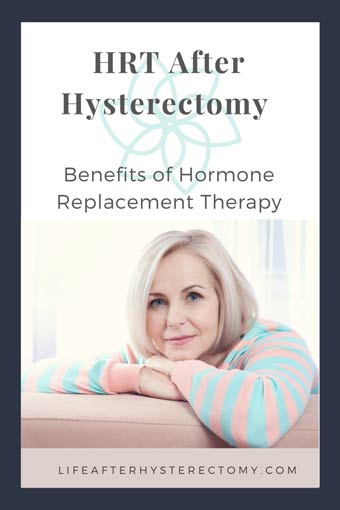HRT After Hysterectomy – Benefits of Hormone Replacement Therapy
Will you need HRT after hysterectomy surgery? This is a decision some women have to make soon after the operation. When they remove the tubes and ovaries during the hysterectomy (salpingo-oophorectomy), you can expect a sudden onset of menopausal symptoms.
This blog is reader-supported. When you buy through a link on our site, we earn a commission at no extra cost to you. Read more

These symptoms may suddenly hit you from 48 hours to a few weeks after the operation.
When the levels of these hormones in your body drop, your body reacts with some unpleasant symptoms.
Normally, when a woman goes through menopause, the ovaries gradually stop making the sex hormones estrogen, testosterone, and progesterone.
But with surgical menopause, these symptoms can come all at once and are usually very intense.
With hormone replacement therapy (HRT) they restore your hormone levels, and most of these menopausal symptoms are kept at bay.
However, HRT after hysterectomy is not suitable for every woman. If you want to take HRT, discussing this with your doctor is advisable. Let him/her explain to you the pros and cons of HRT.
Based on how severe your menopausal symptoms are, your age, and your medical history, he will tell you about possible risks.
For example, HRT is not suitable for you if you have a history of
• Heart disease
• Stroke
• Thrombosis
• Breast cancer, ovarian cancer, or endometrial cancer
• H
HRT dangers
A study by the Women’s Health Initiative published in 2002 warned women that HRT was not the miracle drug people thought it was; on the contrary, it could pose an increased risk of breast cancer, stroke, and heart disease, especially if there were a delay in initiating HRT. The benefits were primarily seen in those who started HRT sooner rather than later in the menopause process. Naturally, this scared women, and as a result, the use of HRT dramatically declined in the following years.

For the past decade, they carried out many studies about hormone replacement therapy’s health benefits and risks.
Newly updated recommendations help women by giving them more balanced and precise advice on HRT after hysterectomy and during menopause. The updated guidelines provide the latest evidence about HRT’s risks and health benefits.
More recent clinical trials also found that the risks are considerably lower when a woman uses a transdermal estrogen patch with a low dose of estrogen instead of a high or low dose of oral HRT.
Other studies searching for an HRT cancer link found that the risk of breast cancer is lower when women use estrogen-only instead of the combined HRT (estrogen and progesterone).
Benefits of HRT after hysterectomy
When you take HRT after your hysterectomy, you may find relief from several side effects of a hysterectomy.
- Relief of vasomotor symptoms (hot flashes and night sweats)
- Reducing your risk of colon cancer
- It improves sexual desire and vaginal lubrication
- Reduces mood swings and depressive symptoms
- It may relieve symptoms of bladder problems and prevent recurrent urinary tract infections
- Protects women from osteoporosis
How long is it safe to use HRT after hysterectomy?
The truth is the longer you take HRT, the more you risk health problems. Most health professionals tell women now to use HRT in the lowest possible dose and not for longer than five years.
The HRT treatment and duration differ from person to person, but they advise women to check with their doctor once a year if they need to continue the treatment.
How to take HRT?
There are several ways a woman can take HRT after hysterectomy, like:
• Tablets
• Creams and gels
• Skin patches
• Pellets placed under the skin (subcutaneous implants)
Your healthcare provider can tell you what works best for your symptoms. Usually, creams and gels applied inside the vagina are enough to treat vaginal dryness, whereas patches and implants are better for treating hot flashes and preventing osteoporosis.
Reviewed by: Kimberly Langdon M.D. (OB/GYN)
Date reviewed: 17/3/2019


I had some removal when I was 34 I am now 63 and suffer from loss of libido , tiredness, snappy irritable, and constant head sweats and full sweats at night
I very recently had full abdominal hysterectomy. Abruptly , after I began night sweats. They have improved a little from few days in hospital as I became my blood level was abit anemic. At home ,I have been trying to replenish by vitamins & nutrient enriched fruits and vegetables. I am considering herbal supplements Black Cohash and Vaginal moisturizers to help alleviate and control these sudden side effects. I do feel a sudden loss from my reproductive organs and loss of hormones. I am concerned about all possible side effects! Plus.. the pain and swelling afterwards. I hold tight to my FAITH and trust God to see me through.